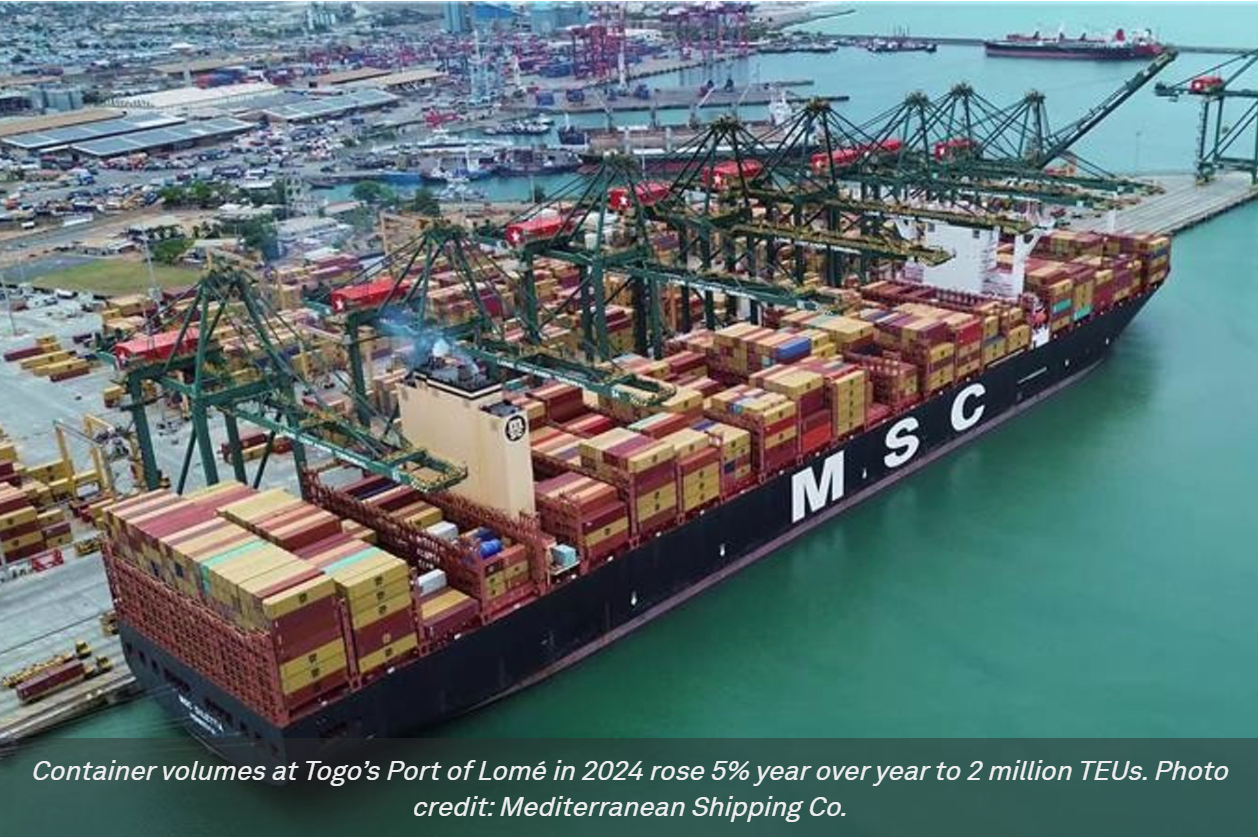
Mediterranean Shipping Co.'s recent deployment of the largest vessels in its fleet to West African ports shows how the container line is capitalizing on the regional market and reducing its reliance on European hubs for transshipping.
The deployment in April of 24,000-TEU ships on its Africa Express service allows MSC to better leverage billions of dollars invested in West Africa in recent years, reducing exposure to congested North European ports and tapping growing regional demand. West Africa's GDP is forecast to expand 4.3% in 2025–26, according to the African Development Bank.
The service connecting West Africa with north and southeast Asia calls Tema, Ghana and its longstanding hub in Lomé, Togo. Container volumes at Lomé last year rose 5% year over year to 2 million TEUs, according to an Invest in Togo report.
MSC's European hub-and-spoke network relies on Antwerp, Gioia Tauro, Rotterdam and Valencia, yet its $6.1 billion acquisition of Bolloré Africa Logistics (renamed Africa Global Logistics [AGL]) in 2022 opened new possibilities for the carrier.
At MSC's emerging hub in Abidjan, Côte d'Ivoire, where a second terminal operated by AGL opened in 2022, volumes rocketed 29% last year to 1.6 million TEUs, the Ecofin Agency said. The new facility expanded Abidjan's container capacity to 2.5 million TEUs.
MSC was not available for comment.
Creating new hubs‘makes sense’
The growth in West Africa's transshipment volumes is more than just a result of major carriers routing ships around the Cape of Good Hope to avoid Houthi rebel attacks in the Red Sea, analysts tell the Journal of Commerce. Transshipping through Lomé and Abidjan allows MSC to reduce exposure when port congestion hits Antwerp and Rotterdam, as has been the case since the start of 2025.
Setting up hubs closer to Europe — but not in Europe — could allow carriers to reduce payments under the EU Emissions Trading Scheme, which launched in 2024, said Jan Hoffmann, the World Bank's global lead for maritime transport and ports.
“The region used to be connected to the rest of the world via transshipment services in Antwerp or Rotterdam [but] now counts on numerous direct connections, with the largest vessels,”said Hoffmann.“Deploying ultra large container ships [ULCSs] on that route and establishing hubs in [the West Africa] region makes sense for a number of reasons.”
In addition to reducing payments under the EU Emissions Trading Scheme, those reasons include improvements to roads connecting West African ports.
As the largest operator of container ship tonnage and free of a shipping alliance partner, MSC is well positioned to make bolder moves within its network, said Jeremy Masters, managing director of Shipping Masters and a Journal of Commerce contributor.
Other container lines serve West Africa but have yet to significantly drive transshipment volumes, Masters said. For example, CMA CGM deploys 16,000-TEU ships on its West Africa loop connecting Pointe-Noire in the Republic of Congo to Qingdao, China. Ocean Network Express’ services to the region are more focused on loops serving West Africa than feeding a node connecting deep-sea services to short-sea services.
West Africa ports are growing and modernizing. DP World is spending $1.2 billion to construct a greenfield facility at Ndayane in Senegal. When phase one is completed in 2027, the port’s 1.2 million TEU container capacity will reduce pressure on the country's other major port, Dakar.
The ULCSs will likely be repatriated to the Suez Canal routing when maritime safety is restored to the Red Sea, Masters said.“But if Lomé has by that time proven [itself] through its local and regional feed of volume, and then if MSC looks at other deep-sea routes that connect through, then I think [the port] would have established itself in its own right,”he said.
Still, such is the combined impact of the size of the global container ship order book and the amount of vessels likely to be freed up by the would-be shorter Suez routings that it can be argued that West Africa's increasing attractiveness could be just the way to put all the extra tonnage to good use.

